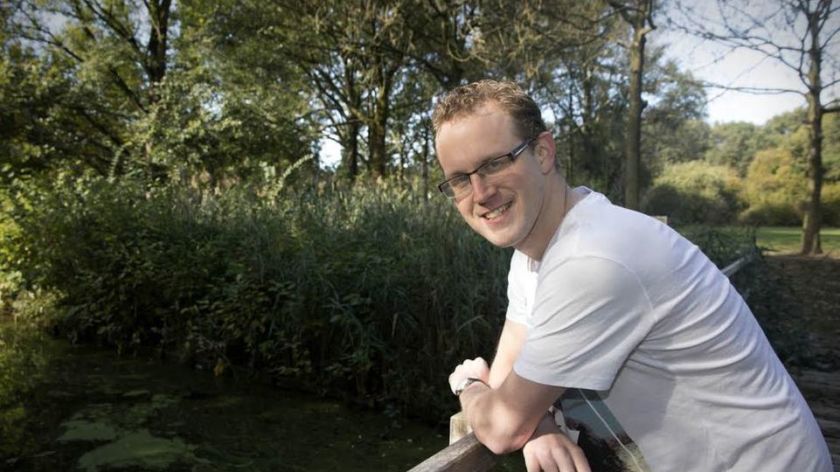Make the world a little better: contribute to happiness
-
 Photo: Gerard Verschooten
Photo: Gerard Verschooten
You don't immediately have to change the world, but do something! After Lucas de Man, theater producer, called for small-scale action last month, Vox found students who give a good example. This time, the recently graduated sociologist Lerrie Grooten, who knows the key to a happier society.
One of your first activities was writing ’thank you e-mails’. How did you come up with that idea?
‘At the end of 2015, I first found positive psychology. A video interview with the American psychologist Shawn Anchor inspired me to do something. According to research, it improves your feeling of social connection when you send a thank you e-mail every day for three weeks. Social connection effects your health in the same way sports do, and it is the most important long-term predictor for happiness. Not only does an e-mail like that make someone else’s day, I myself feel good writing it. It also changes the way you look at the world and the people around you, because you reflect on the things you are thankful for and you relive positive moments. I also get a lot of nice reactions. Radio station 3FM interviewed me after an e-mail to a radio dj and one of my favourite artists, Julianna Barwick, recognised me months later, because I sent her one.’
What else do you do?
‘Last August, I executed 170 ‘random acts of kindness’ within 21 days. According to research, altruistic acts increase happiness. Next year’s August, I want to do six hundred more, a year later a thousand, together with others in Nijmegen. After that, ten thousand with the rest of the people in the Netherlands, in 2020 hundred thousand with everybody in Europe and in 2021, one million happiness acts with the rest of the world. I hope that eventually, everybody joins in.’
The whole world, that is quite a lot. How do you want to reach that?
‘I try to approach the media and to give a good example myself. I also hope to get some publicity with the bigger operations, so that more people see it. I am not sure how to do that yet, but I want to spread the message of positive psychology as much as possible. So much positivity and happiness can come out of that, that you can actually change the world. What helps, is that the acts are very accessible. An e-mail, or another happiness act usually only costs two or three minutes.’
Is this a way to tackle all problems in the world?
‘It is not a miracle cure. Some think that positive psychology means you always have to think: “everything will be alright”. But you have to be willing to put in the effort. When you hurt your back, positive thinking won’t help you. You will have to go to a physiotherapist and do your exercises. But when you are willing to come into action, I really think positive psychology can bring you a lot. Even if you have been a pessimist for eighty years. But you shouldn’t think positive psychology will make sure you are happy for the rest of your life. When you are always happy, something is wrong with you. It is normal to experience set backs and to be disappointed. But you recover from those things faster when you try to stay positive. On top of that, you can learn a lot from bad things that happen. When a job makes you unhappy, you can try to find out why. Maybe you miss freedom or social interaction in your job. With that knowledge, you can do something.
More information about Grooten on his website.
[kader-xl]
Four starting points for a more positive life.
Thank you e-mail
Send a thank you message on whatsapp, facebook or e-mail. Tell that person what you are thankful for and compliment them, and try to do that for 21 days, writing someone else every day. The e-mail does not have to be long. Typing a few sentences in two minutes is enough.
Sincere compliments
Compliment someone every day for a week. Tell a professor their class was good, or compliment your classmate on their clothes. When you have problems remembering to do this, you can hang a note on your mirror.
Do nice things
Do nice thinks for the people around you. Buy a candy bar in the Cultuurcafe and give it back to the bartender. Offer a younger student free tutoring. Hand out cake at the cafetaria. Give something small to a stranger or sit with someone who is alone. On this website are many more ‘random acts of kindness’ that vary in time, effort and money.
Pay attention to what you are thankful for
When you are brushing your teeth, think about three new things that you are thankful for in the past day. They have to be specific and new. For example, the coffee break with a friend or a nice text from your mother.
[/kader-xl]



